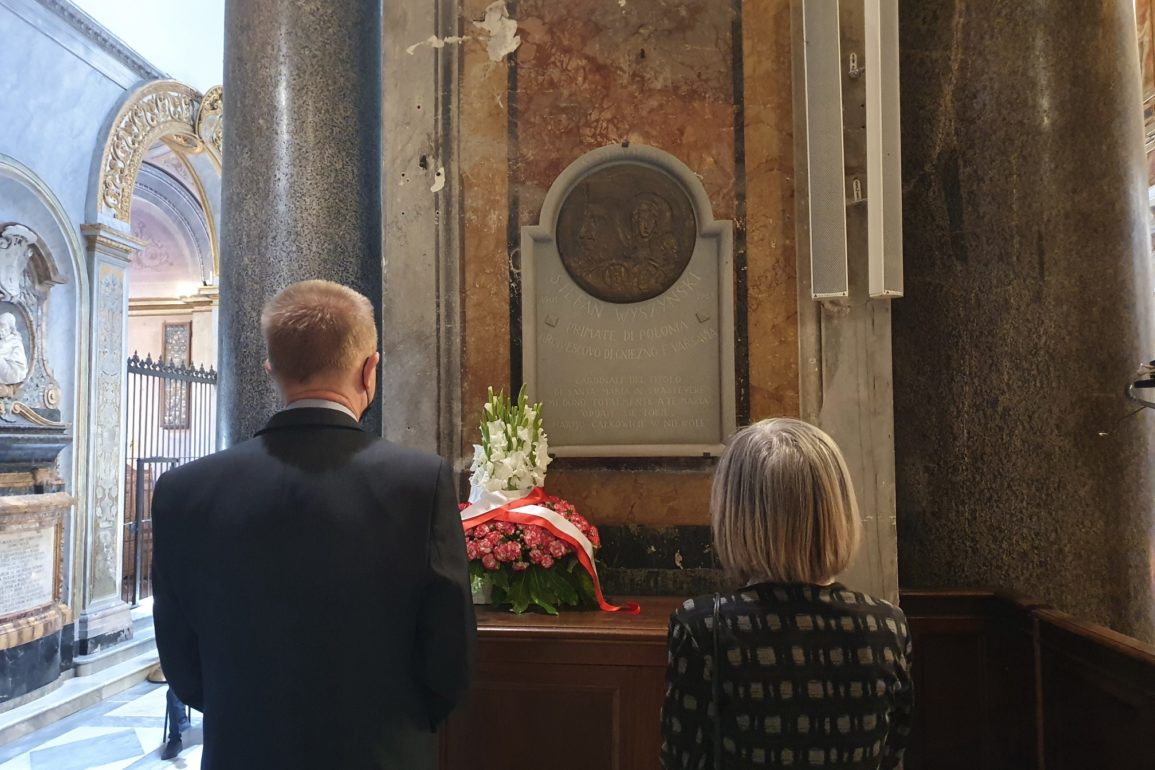Only Karol Wojtyla’s fame overshadows that of Cardinal Stefan Wyszynski (1901-1981), Archbishop of Gniezno and Warsaw and Primate of Poland, who also took part in the second conclave of 1978, which elected the first Polish Pope in history with the name John Paul II. The first non-Italian pope in centuries was elected October 16, 1978. A few days later, on October 23, Pope John Paul II wrote of Cardinal Wyszynski in his famous “Letter to Poles:”
“This Polish Pope, who today full of fear of God, but also of trust, is beginning a new pontificate, would not be on Peter’s Chair were it not for your faith, which did not retreat before prison and suffering. Were it not for your heroic hope, your unlimited trust in the Mother of the Church! Were it not for Jasna Gora, and the whole period of the history of the Church in our country, together with your ministry as Bishop and Primate!”
Cardinal Wyszynski died at 79, on May 28, 1981 in Warsaw. The news reached Pope John Paul II while he was recovering in Rome’s Gemelli Polyclinic Hospital, after having been miraculously saved from the attack on May 13 in Saint Peter’s Square, at the hand of Turkish Ali Agca. No doubt that at the moment of hearing the news, the words Wyszynski said to him after his election as pope came to John Paul II’s mind: “If the Lord has called you, you must introduce the Church in the Third Millennium” (John Paul II, Angelus, May 29, 1994).
However, it was Wyszynski to introduce Poland in 1966 in its second millennium of Christian history, celebrating solemnly as Polish Cardinal Primate the 1,000 years of the nation’s baptism.
For the 40th anniversary of the “Primate of the Millennium’s” death, the Ambassador of Poland to the Holy See, Janusz Kotanski, placed a floral tribute on the plaque, dedicated to Wyszynski, in the church of Santa Maria in Trastevere, the titular church of the Cardinal Archbishop of Gniezno-Warsaw. The celebration of the 40th anniversary of his death and of the 120 years of his birth will culminate next September 12 in Poland, with the beatification of Cardinal Wyszynski, postponed already twice due to the pandemic. On October 2, 2019, Pope Francis signed the decree of the miracle attributed to his intercession. It was John Paul II who initiated the Cause of Beatification in 1989.
Born in 1901 to a poor and humble family, ordained a priest at 23, Stefan Wyszynski promoted several educational and social initiatives in Christian labor unions, supporting the Catholic Union of Young Workers. During World War II, he was chaplain of the Hospital of the anti-German insurgents close to Warsaw and of the underground soldiers of the National Army, which was combatting the Nazi invaders. After having escaped as an underground priest from the deportation to Auschwitz, at 47 he was already Archbishop of Warsaw and Primate of Poland, which entered the orbit of Soviet Communist at the end of the War. Announced on November 29, 1952 was his appointment as cardinal, although the Polish authorities denied him a passport to take part in the Consistory where Pius XII would have imposed on him the cardinal’s hat.
Subsequently, on May 8, 1953, the Polish Primate addressed a message to the rulers of his country, which then became famous as “Non possumus,” affirming the Polish Church’s will not bow to the persecution. Therefore, on September 24, 1953, Wyszynski was arrested and locked up in a prison in isolation for over three years. Thus he then became the human-symbol of his people’s resistance to the Communist dictatorship.
During the celebrations of the first Christian millennium of Poland, it was his decision to carry in procession an empty frame, as loud protest against the authorities’ decision to seize the copy of the venerated Madonna of Czestochowa that should have visited all the country’s dioceses.
In the meantime, the young Archbishop of Krakow, Karol Woytyla, had people talking about him in the homeland as well as outside. The Polish Authorities tried in vain to undermine the understanding between the two. “If they choose you, you must accept,” Wyszynski exhorted Wojtyla, younger than him by almost 20 years, during the voting in the Conclave of October 1978. Just as moving as it was then, already 43 years later, is it to see again today on TV the scene of the strong embrace between the two, at the end of John Paul II’s first Mass in Saint Peter’s Square.
Rome’s church of Santa Maria in Trastevere was for years the Titular Church of Poland’s Primates. But around the plaque that commemorates Cardinal Wyszynski, behind the last column of the row that separates the central nave and the right nave, there now are unfortunately several signs of neglect.
Yet, today, after placing the floral tribute, Ambassador Kotanski observed: “We cannot really understand the figure and importance of Saint John Paul II without knowing the figure of Stefan Wyszynski.”
“Therefore, soon, we hope, within this year, there will be a restoration of the plaque and a clean-up of the area where it is placed,” announced the Ambassador.










